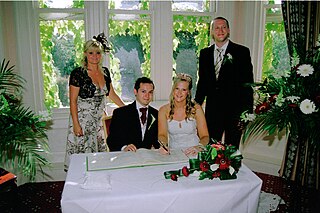
A public limited company is a type of public company under United Kingdom company law, some Commonwealth jurisdictions, and the Republic of Ireland. It is a limited liability company whose shares may be freely sold and traded to the public, with a minimum share capital of £50,000 and usually with the letters PLC after its name. Similar companies in the United States are called publicly traded companies. Public limited companies will also have a separate legal identity.

In Anglican church history, Nonconformists were Protestant Christians who did not "conform" to the governance and usages of the state church—in England, and in Wales until 1914, the Church of England.
A dissenter is one who dissents (disagrees) in matters of opinion, belief, etc. Dissent may include political opposition to decrees, ideas or doctrines and it may include opposition to those things or the fiat of a government, political party or religion.

The General Register Office for England and Wales (GRO) is the section of the United Kingdom HM Passport Office responsible for the civil registration of births, adoptions, marriages, civil partnerships and deaths in England and Wales and for those same events outside the UK if they involve a UK citizen and qualify to be registered in various miscellaneous registers. With a small number of historic exceptions involving military personnel, it does not deal with records of such events occurring within the land or territorial waters of Scotland, Northern Ireland or the Republic of Ireland; those entities' registration systems have always been separate from England and Wales.

The Intellectual Property Office of the United Kingdom is, since 2 April 2007, the operating name of The Patent Office. It is the official government body responsible for intellectual property rights in the UK and is an executive agency of the Department for Science, Innovation and Technology (DSIT).
A Nonconformist register is broadly similar to a parish register, but deriving from a nonconformist church or chapel.
The right to freedom of religion in the United Kingdom is provided for in all three constituent legal systems, by devolved, national, European, and international law and treaty. Four constituent nations compose the United Kingdom, resulting in an inconsistent religious character, and there is no state church for the whole kingdom.

The General Register Office for Scotland (GROS) was a non-ministerial directorate of the Scottish Government that administered the registration of births, deaths, marriages, divorces and adoptions in Scotland from 1854 to 2011. It was also responsible for the statutes relating to the formalities of marriage and conduct of civil marriage in Scotland. It administered the census of Scotland's population every ten years. It also kept the Scottish National Health Service Central Register.

The United Kingdom Census of 1841 recorded the occupants of every United Kingdom household on the night of Sunday 6 June 1841. The enactment of the Population Act 1840 meant a new procedure was adopted for taking the 1841 census. It was described as the "first modern census" as it was the first to record information about every member of the household, and administered as a single event, under central control, rather than being devolved to a local level. It formed the model for all subsequent UK censuses, although each went on to refine and expand the questions asked of householders.
A clerk of the peace held an office in England and Wales whose responsibility was the records of the quarter sessions and the framing of presentments and indictments. They had legal training, so that they could advise justices of the peace.

The 1710 British general election produced a landslide victory for the Tories. The election came in the wake of the prosecution of Henry Sacheverell, which had led to the collapse of the previous government led by Godolphin and the Whig Junto.

The Act 53 Geo. 3. c. 160, sometimes called the Doctrine of the Trinity Act 1813, the Trinitarian Act 1812, the Unitarian Relief Act, the Trinity Act, the Unitarian Toleration Bill, or Mr William Smith's Bill, was an Act of the Parliament of the United Kingdom which amended its blasphemy laws and granted toleration for Unitarian worship.

A private company limited by shares is a class of private limited company incorporated under the laws of England and Wales, Hong Kong, Northern Ireland, Scotland, certain Commonwealth jurisdictions and the Republic of Ireland. It has shareholders with limited liability and its shares may not be offered to the general public, unlike those of a public limited company.
National Records of Scotland is a non-ministerial department of the Scottish Government. It is responsible for civil registration, the census in Scotland, demography and statistics, family history, as well as the national archives and historical records.

The Toleration Act 1688, also referred to as the Act of Toleration, was an Act of the Parliament of England. Passed in the aftermath of the Glorious Revolution, it received royal assent on 24 May 1689.

The Places of Worship Registration Act 1855 is an Act of the Parliament of the United Kingdom which governs the registration and legal recognition of places of worship. It applies only in England and Wales, and does not cover the Church of England which is exempt from the Act's requirements. Nor does it affect the Church in Wales, which remains part of the Anglican Communion although it is no longer the Established Church in Wales. Registration is not compulsory, but it gives certain financial advantages and is also required before a place of worship can be registered as a venue for marriages.

A civil, or registrar, ceremony is a non-religious legal marriage ceremony performed by a government official or functionary. In the United Kingdom, this person is typically called a registrar. In the United States, civil ceremonies may be performed by town, city, or county clerks, judges or justices of the peace, or others possessing the legal authority to support the marriage as the wedding officiant.

The Liberty of Religious Worship Act 1855 was an Act of the Parliament of the United Kingdom.

The Places of Religious Worship Act 1812 was an Act of the Parliament of the United Kingdom. It updated the Toleration Act 1688's system of registration for places of worship used by Protestant Dissenters except Quakers and set up a system of punishments for offenders against the Act. It also repealed the Five Mile Act 1665 and the Conventicles Act 1670.











